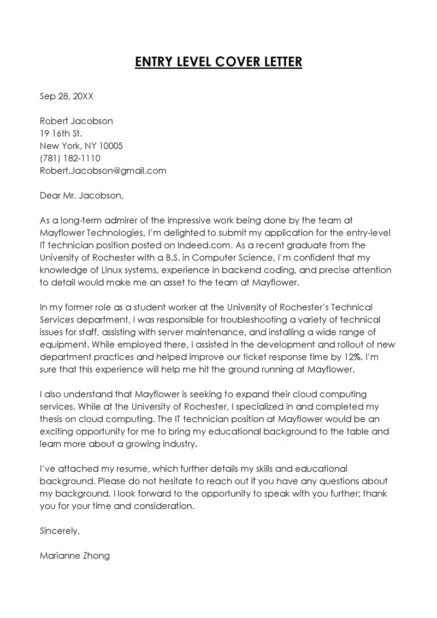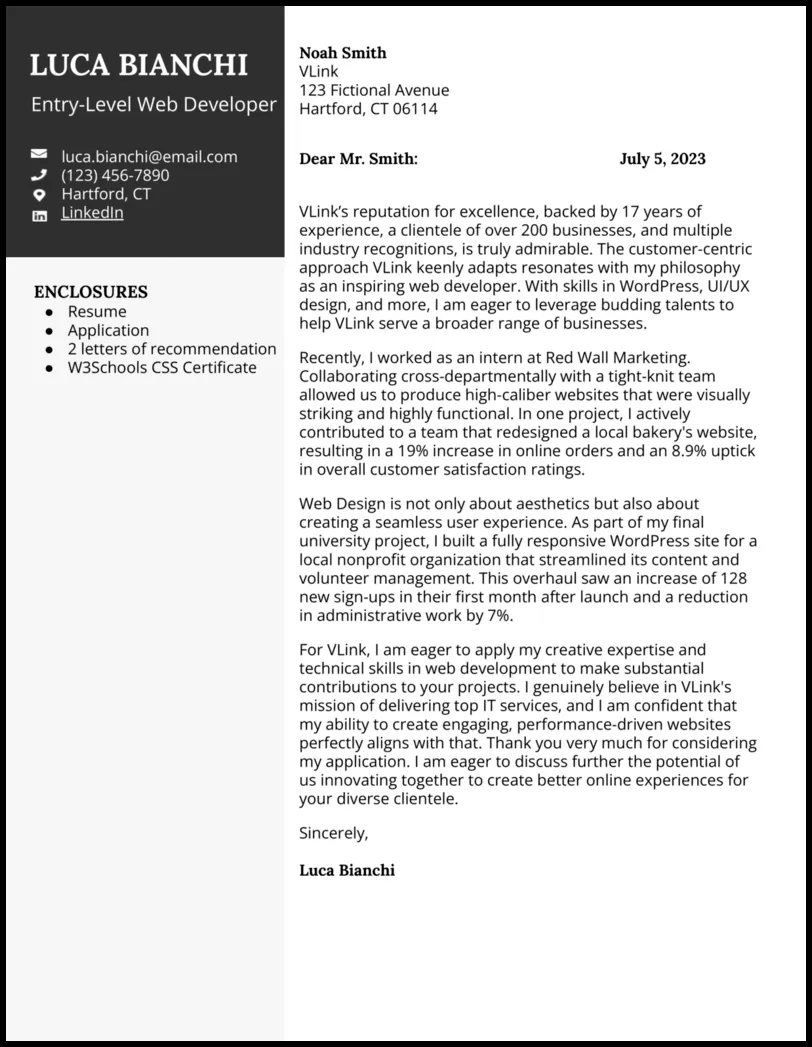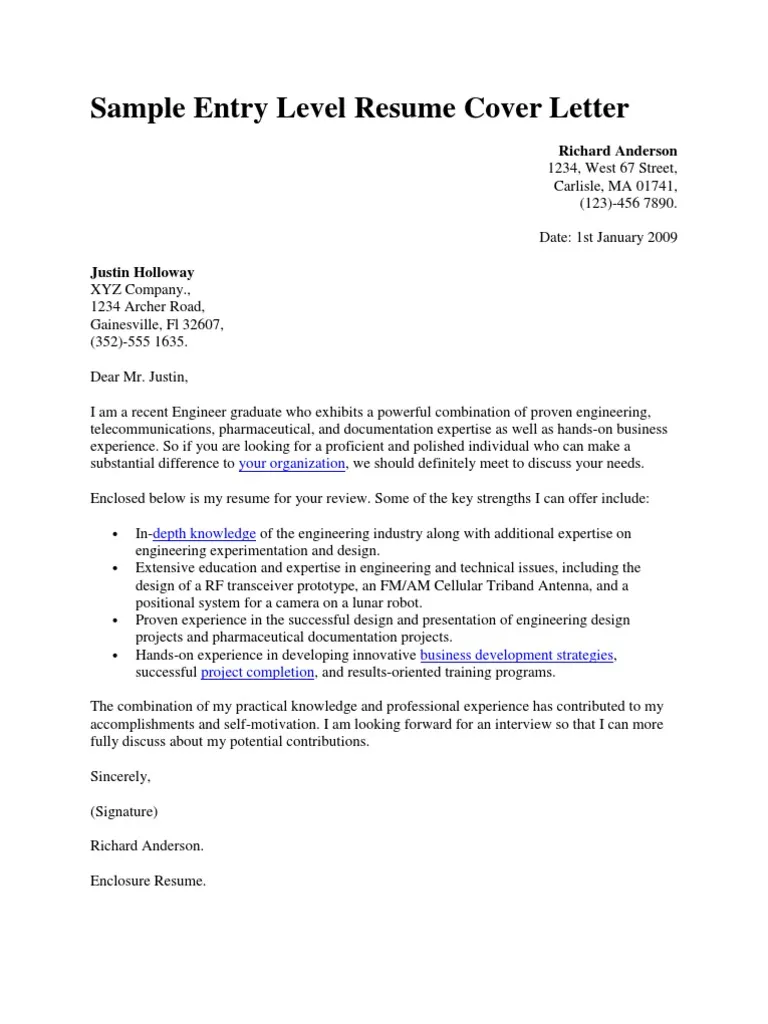Why Entry Level Cover Letters Are Crucial
In the competitive job market, especially for entry-level positions, a well-crafted cover letter can be your secret weapon. Many job seekers underestimate the power of a cover letter, viewing it merely as a formality. However, this document is your first opportunity to make a strong impression and differentiate yourself from other applicants. A cover letter allows you to highlight your skills, experience, and personality in a way that a resume alone cannot. It’s a chance to connect with the hiring manager on a more personal level and demonstrate your genuine interest in the role and the company. Remember, many hiring managers consider a cover letter as important as your resume, using it to assess your communication skills and attention to detail.
Highlighting Your Skills and Experience
Since entry-level candidates may lack extensive professional experience, the cover letter is your chance to showcase transferable skills and relevant experiences. Think about any projects, volunteer work, or extracurricular activities that demonstrate the skills required for the job. Identify the key skills mentioned in the job description and provide specific examples of how you’ve utilized those skills in the past. Quantify your achievements whenever possible. For example, instead of saying ‘I improved customer service,’ state ‘Improved customer satisfaction scores by 15% through active listening and problem-solving techniques.’ Use this space to bridge the gap between your academic or personal experiences and the requirements of the job. This is especially important for entry-level roles where employers are looking for potential and a willingness to learn.
Understanding the Purpose of a Cover Letter

The primary purpose of an entry-level cover letter is to persuade the hiring manager to read your resume and consider you for an interview. It’s not just a summary of your resume; it’s a narrative that explains why you’re a good fit for the role and the company. Your cover letter should demonstrate your understanding of the company’s values, mission, and the specific requirements of the job. This shows that you’ve done your research and are genuinely interested in the opportunity. Furthermore, a well-written cover letter showcases your writing skills, attention to detail, and professionalism. It provides a glimpse into your personality and communication style, allowing the hiring manager to assess whether you would be a good cultural fit within the organization. The goal is to leave a lasting positive impression and secure that all-important interview.
What to Include in Your Entry Level Cover Letter
Your cover letter should include essential elements to make it effective. Start with a professional salutation, addressing the hiring manager by name if possible (research the name on LinkedIn or the company website). The opening paragraph should immediately grab the reader’s attention, expressing your interest in the specific position and company. Briefly mention how you learned about the opportunity. In the body paragraphs, highlight relevant skills, experiences, and achievements that align with the job description. Use specific examples to demonstrate your abilities, quantify your accomplishments whenever possible. Show enthusiasm for the role and the company’s mission. In the closing paragraph, reiterate your interest, thank the hiring manager for their time and consideration, and include a call to action, such as expressing your availability for an interview. Conclude with a professional closing, like ‘Sincerely’ or ‘Best regards,’ followed by your name.
Personalizing Your Cover Letter
One of the biggest mistakes job seekers make is sending generic cover letters. To stand out, you must personalize your cover letter for each job application. Research the company and the specific role to understand their needs and values. Tailor your letter to address the specific requirements outlined in the job description. Highlight the skills and experiences that are most relevant to the position. Mention specific projects, accomplishments, or coursework that demonstrate your suitability. Show that you understand the company’s mission and how your skills can contribute to their success. Demonstrate that you are not just sending out a generic application but are genuinely interested in the opportunity and the company. This level of personalization shows that you’ve taken the time to learn about the role and are serious about being considered.
Formatting Your Entry Level Cover Letter

Proper formatting is essential for making your cover letter easy to read and visually appealing. Use a professional font, such as Arial, Times New Roman, or Calibri, with a font size between 10 and 12 points. Maintain consistent spacing and use clear, concise language. Keep the letter to one page, as hiring managers often have limited time to review applications. Use headings and bullet points to break up large blocks of text and make it easier to scan. Ensure there are no grammatical errors or typos. Proofread carefully and consider using a grammar checker to catch any mistakes. Choose a professional and readable layout. A well-formatted cover letter shows attention to detail and professionalism.
Proofreading and Editing Your Cover Letter
Proofreading and editing are critical steps in ensuring your cover letter is polished and professional. Carefully review your cover letter for any grammatical errors, typos, or spelling mistakes. Even a minor error can create a negative impression. Read your cover letter aloud to catch any awkward phrasing or sentences that don’t flow well. Ask a friend, family member, or career advisor to review your letter. A fresh pair of eyes can often spot mistakes that you might miss. Check your cover letter on different devices to ensure it displays correctly. Proofread your letter at least twice. Make sure your contact information is correct and up-to-date. Accuracy is key.
Tips for a Standout Cover Letter
To make your entry-level cover letter truly stand out, consider these additional tips. Research the company culture and tailor your language and tone to fit. Highlight any unique skills or experiences that align with the job description. Showcase your personality and passion for the role. Demonstrate your understanding of the company’s products, services, or mission. Explain why you’re a good fit, both in terms of skills and cultural alignment. Be enthusiastic and genuine, showing your excitement about the opportunity. If possible, mention a specific accomplishment that is relevant to the job description. Avoid clichés and generic phrases. Use strong action verbs to describe your skills and experiences. Ensure your cover letter complements your resume and provides additional context for your application. A standout cover letter will capture the hiring manager’s attention and increase your chances of getting an interview.
Using Action Verbs

Using strong action verbs is crucial for making your cover letter impactful and engaging. Action verbs help to demonstrate your accomplishments and make your experience more compelling. Instead of using passive language, such as ‘responsible for,’ use action verbs like ‘managed,’ ‘developed,’ ‘implemented,’ ‘achieved,’ and ’led.’ Start each bullet point or sentence with an action verb to grab the reader’s attention and highlight your skills and achievements. Some examples of effective action verbs include: created, organized, coordinated, designed, improved, and increased. When describing your skills, make sure to use verbs that reflect your abilities and the requirements of the job. This will make it easier for the hiring manager to understand what you did and the value you brought. Action verbs are a key ingredient in a strong, persuasive cover letter that effectively showcases your qualifications.
Tailoring to the Job Description
Each cover letter you send should be tailored to the specific job description. Carefully review the job posting, paying close attention to the required skills, qualifications, and responsibilities. Identify the key requirements and highlight the relevant skills and experiences in your cover letter. Use the same keywords and phrases that the employer uses in the job description. This shows that you understand what the company is looking for and that you have the qualifications to succeed in the role. Avoid sending a generic cover letter. Customize your letter to address the specific needs and expectations of the position. By tailoring your cover letter, you significantly increase your chances of getting noticed and securing an interview. Consider the company’s culture and values when tailoring your letter. This will demonstrate that you are a good fit and understand their mission.
Making a Strong First Impression
Your cover letter is your first opportunity to make a positive impression on the hiring manager. Start by addressing the hiring manager by name, if possible. Research the company and role so you can demonstrate your interest and understanding. Your introduction should be concise and compelling, expressing your enthusiasm for the opportunity. Highlight your most relevant skills and experiences, using specific examples to show your abilities. Use a professional tone, ensuring your cover letter is well-written and free of errors. Show how your skills and experiences align with the job description. Demonstrate your knowledge of the company and the industry. Show your personality and let your enthusiasm shine through. By making a strong first impression, you increase the chances of getting your resume reviewed and securing an interview.
Contact Information and Salutations

Your cover letter should clearly display your contact information. Include your full name, phone number, email address, and LinkedIn profile URL, if you have one. Make sure your contact information is up-to-date and easily accessible. Choose a professional email address. In the salutation, address the hiring manager by name, if possible (research the name via LinkedIn or the company website). If you can’t find the hiring manager’s name, use a professional greeting such as ‘Dear Hiring Manager’ or ‘Dear [Department Name] Team.’ Avoid generic salutations, such as ‘To Whom It May Concern.’ Use a professional closing, such as ‘Sincerely,’ ‘Best regards,’ or ‘Respectfully,’ followed by your full name. This level of detail demonstrates professionalism and attention to detail, which is key to your job search.
